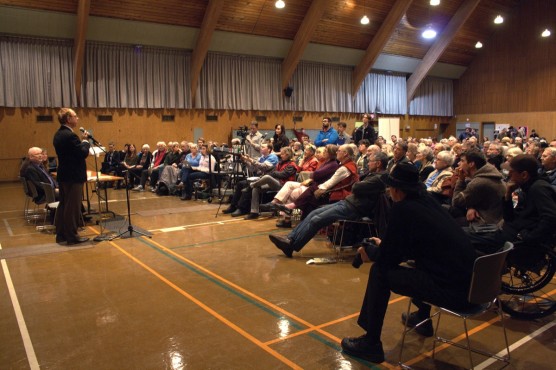
While addressing the crowd at the First Metropolitan United Church, NDP MPs Randall Garrison and Murray Rankin criticized proposed anti-terror legislation as fear-mongering and an invasion of privacy. Photo by Sarah Allan (Photo Editor)
On Feb. 27, NDP MPs Randall Garrison and Murray Rankin hosted a public consultation in Victoria on the 2015 Anti-Terrorism Act, commonly referred to as Bill C-51. Garrison and Rankin invited Reg Whitaker, an adjunct UVic professor and expert on government surveillance and privacy issues, and Laurel Collins, a UVic instructor with a focus on activism and social movements. All four speakers agreed to hold the consultation following a significant outcry from many people in Victoria, particularly UVic students.
The proposal would require the Canadian Security Intelligence Service (CSIS) to report any “activities that undermine the security of Canada” which CSIS discovers through surveillance programs. The NDP claims that the bill would “threaten activists . . . environmental groups, and First Nations” who oppose the agendas of the Canadian government.
Rankin, the MP from Victoria and former UVic law professor, stated that the Conservative Party has introduced new proposals for anti-terrorism measures in order to heighten Canadians’ fears of terrorism. Rankin opened by saying that, as a witness to the shooting at Parliament Hill in October, he knows terrorism is a real threat. However, he believes Bill C-51 goes too far to address this threat. He implied that it is no coincidence that this bill has appeared shortly before what polls show will be a close federal election. The Conservatives may hope that a frightened electorate will vote for their party, which has built a reputation as tough on crime and tough on terror. However, this effort may backfire, as the potential voters at the public consultation seemed less fearful of ISIS and more fearful of CSIS.
Garrison, the MP from Esquimalt-Juan de Fuca, serves as the official opposition’s Public Safety Critic and has played a prominent role in the ‘liberty versus security’ debate in Ottawa. He argues that Bill C-51 “will dismantle the privacy rights of all Canadians” as it “would authorize CSIS to do things like shut down someone’s Internet service, maybe shut off someone’s phone service, or conduct surveillance on private conversations.” He believes the language of the bill is “dangerously vague” and, if enacted, would probably be “ineffective against terrorism” and “the radicalization of youth.” Garrison claimed to oppose this legislation alongside many prominent political figures, including four former Prime Ministers, five former Supreme Court justices, and six former Ministers of Justice. UVic instructors Whitaker and Collins both called Bill C-51 a threat to dissent in Canada. Collins noted that CSIS could crack down on sit-ins, marches without permits, and other effective forms of civil disobedience. Whitaker highlighted the fact that Bill C-51 aims to protect “critical infrastructures” including pipelines. Those who peacefully protest pipelines, often students and Aboriginals, may be labelled as threats to Canadian security. Collins claimed that the bill will give CSIS the power to delete computer files and drain bank accounts of these and other peaceful protesters. Whitaker concluded by saying, “we don’t want a ‘1984’ society where the Canadian government knows everything about you.”
Not all UVic students oppose the measures described in the bill. Ryan Trelford, President of the UVic Conservative Club, supports Bill C-51, believing it is necessary to respond faster to terrorist threats. Trelford states that CSIS currently needs the approval of a judge “before they can do any type of ‘hands-on approach’ stuff. Basically, if they see a plot, they have to legally wait until they can do anything.” The proposed changes would allow police to urgently react to threats to public safety, “cutting red tape, making security more efficient, and keeping Canadians safe.”
The 2015 Anti-Terrorism Act will surely be a wedge issue in the 2015 federal election. When Canadians go to the polls this year, they will decide whether or not to retain a government which supports giving CSIS expanded powers.






